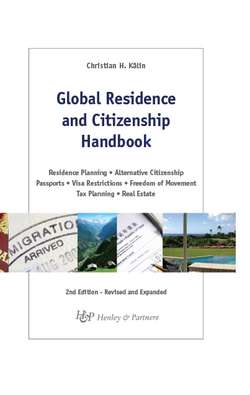Читать книгу Global Residence & Citizenship Handbook - Christian H. Kälin - Страница 34
На сайте Литреса книга снята с продажи.
1.6 Financial planning and insurance
ОглавлениеFor many wealthy people, an alternative residence is an effective tool for international tax planning, but it also increases the financial planning options and facilitates more privacy in investment and banking.
Anyone who is transferring their residence to another jurisdiction will certainly have to revisit their financial and estate planning. It is implicit that the various parameters of the financial aspects of one’s estate will be affected. You may be familiar with the legal and fiscal situation and general framework conditions prevailing in your home country but you must become adept with a new framework.
It may make sense to retain investments in other currencies, for example if one moves from the US to Europe, where the local reference currency is the Euro. As a rule, however, a move of a person’s regular activities to a new currency area will also lead to different weighting of the currencies in their personal investment portfolio and will require a re-thinking of their financial planning and asset management arrangements. It may be wise to consult a specialized investment advisor familiar with clients with cross-border issues.
It is also sensible to obtain advice from a tax advisor in the original jurisdiction as there may be some interesting financial and tax planning options, or in a less favorable case, there may be exit taxes due that need to be calculated.
A move abroad also offers the opportunity for more flexible pension planning, as capital tied to government-regulated pension funds can often be released. Previous retirement provisions may have to be reorganized, liquidated or taken out prematurely (e.g. life insurance policies, pension claims, tied-up assurance funds etc.). It is particularly important to consider withholding taxes when receiving payouts from pension institutions and any tax concessions when drawing any benefits in the form of pensions or capital payouts. As a rule, different costs of living also change the provision requirement and usually make it necessary to adapt one’s cash planning.
A move will also require careful examination of previous estate or succession planning (partnerships, foundations, trusts, family holding companies and the like). Here too, considerable scope may be available for optimization depending on one’s destination. Thus anyone moving for example to Malta, the United Kingdom, Ireland, St. Kitts or the Bahamas, can structure their assets by means of suitable succession structures so that they – or lifetime enjoyment thereof – are transferred without restrictions and in many cases also in tax-neutral form to freely designated heirs. The situation will be quite different when moving to a country such as France or Spain, although here too various opportunities for optimization usually exist. In any case, existing estate-planning strategies should be checked and their adaptation to the new conditions and opportunities examined. Professional support is usually indispensable in this domain too.
It is also important to include the aspect of asset protection, especially in the US. In view of the peculiarities of the American legal system, which is characterized by a relatively low threshold of civil litigation, suitable measures to avoid excessive exposure of one’s personal assets are indispensable. But when moving to other countries, it may also make sense to structure at least part of one’s assets – perhaps including real estate – so that they are safe from seizure. Suitably designed asset protection trusts as well as specially structured Swiss annuities and life insurance policies are sensible options for this purpose.
